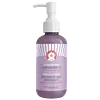What's inside
What's inside
 Key Ingredients
Key Ingredients

No key ingredients
 Benefits
Benefits

 Concerns
Concerns

 Ingredients Side-by-side
Ingredients Side-by-side

Caprylic/Capric Triglyceride
MaskingCitrus Aurantium Dulcis Peel Oil
MaskingLimonene
PerfumingCitrus Limon Peel Oil
MaskingCitrus Reticulata Peel Oil
MaskingMentha Viridis Leaf Oil
AstringentOrbignya Oleifera Seed Oil
EmollientHelianthus Annuus Seed Oil
EmollientOlea Europaea Fruit Oil
MaskingPrunus Armeniaca Kernel Oil
MaskingSimmondsia Chinensis Seed Oil
EmollientVitis Vinifera Seed Oil
EmollientBenzyl Alcohol
PerfumingCitral
PerfumingCitronellol
PerfumingFarnesol
PerfumingGeraniol
PerfumingLinalool
PerfumingCaprylic/Capric Triglyceride, Citrus Aurantium Dulcis Peel Oil, Limonene, Citrus Limon Peel Oil, Citrus Reticulata Peel Oil, Mentha Viridis Leaf Oil, Orbignya Oleifera Seed Oil, Helianthus Annuus Seed Oil, Olea Europaea Fruit Oil, Prunus Armeniaca Kernel Oil, Simmondsia Chinensis Seed Oil, Vitis Vinifera Seed Oil, Benzyl Alcohol, Citral, Citronellol, Farnesol, Geraniol, Linalool
Carthamus Tinctorius Seed Oil
MaskingRicinus Communis Seed Oil
MaskingCaprylic/Capric Triglyceride
MaskingParfum
MaskingCaryodendron Orinocense Seed Oil
EmollientAleurites Moluccanus Seed Oil
Skin ConditioningSqualane
EmollientLimnanthes Alba Seed Oil
Skin ConditioningPongamia Glabra Seed Oil
Skin ConditioningPrunus Armeniaca Kernel Oil
MaskingTetrahexyldecyl Ascorbate
AntioxidantCurcuma Longa Root Extract
MaskingPlumeria Acutifolia Flower Extract
Skin ConditioningMelia Azadirachta Flower Extract
Skin ConditioningEclipta Prostrata Extract
Skin ConditioningMelia Azadirachta Leaf Extract
Skin ConditioningMelia Azadirachta Bark Extract
AntimicrobialCorallina Officinalis Extract
Skin ConditioningMoringa Oleifera Seed Oil
EmollientOcimum Sanctum Leaf Extract
Skin ConditioningOcimum Basilicum Flower/Leaf Extract
TonicLinoleic Acid
CleansingLecithin
EmollientPhytosteryl Canola Glycerides
Skin ConditioningOleic Acid
EmollientPalmitic Acid
EmollientStearic Acid
CleansingTriolein
Skin ConditioningTocopherol
AntioxidantBenzotriazolyl Dodecyl P-Cresol
UV AbsorberBenzyl Salicylate
PerfumingHexyl Cinnamal
PerfumingCoumarin
PerfumingLimonene
PerfumingBenzyl Alcohol
PerfumingHydroxycitronellal
PerfumingLinalool
PerfumingCarthamus Tinctorius Seed Oil, Ricinus Communis Seed Oil, Caprylic/Capric Triglyceride, Parfum, Caryodendron Orinocense Seed Oil, Aleurites Moluccanus Seed Oil, Squalane, Limnanthes Alba Seed Oil, Pongamia Glabra Seed Oil, Prunus Armeniaca Kernel Oil, Tetrahexyldecyl Ascorbate, Curcuma Longa Root Extract, Plumeria Acutifolia Flower Extract, Melia Azadirachta Flower Extract, Eclipta Prostrata Extract, Melia Azadirachta Leaf Extract, Melia Azadirachta Bark Extract, Corallina Officinalis Extract, Moringa Oleifera Seed Oil, Ocimum Sanctum Leaf Extract, Ocimum Basilicum Flower/Leaf Extract, Linoleic Acid, Lecithin, Phytosteryl Canola Glycerides, Oleic Acid, Palmitic Acid, Stearic Acid, Triolein, Tocopherol, Benzotriazolyl Dodecyl P-Cresol, Benzyl Salicylate, Hexyl Cinnamal, Coumarin, Limonene, Benzyl Alcohol, Hydroxycitronellal, Linalool
Ingredients Explained
These ingredients are found in both products.
Ingredients higher up in an ingredient list are typically present in a larger amount.
Benzyl Alcohol is most commonly used as a preservative. It also has a subtle, sweet smell. Small amounts of Benzyl Alcohol is not irritating and safe to use in skincare products. Most Benzyl Alcohol is derived from fruits such as apricots.
Benzyl Alcohol has both antibacterial and antioxidant properties. These properties help lengthen the shelf life of products. Benzyl Alcohol is a solvent and helps dissolve other ingredients. It can also improve the texture and spreadability.
Alcohol comes in many different forms. Different types of alcohol will have different effects on skin. This ingredient is an astringent alcohol.
Using high concentrations of these alcohols are drying on the skin. They may strip away your skin's natural oils and even damage your skin barrier. Astringent alcohols may also irritate skin.
Other types of astringent alcohols include:
According to the National Rosacea Society based in the US, you should be mindful of products with these alcohols in the top half of ingredients.
Any type of sanitizing product will have high amounts of alcohol to help kill bacteria and viruses.
Learn more about Benzyl AlcoholThis ingredient is an emollient, solvent, and texture enhancer. It is considered a skin-softener by helping the skin prevent moisture loss.
It helps thicken a product's formula and makes it easier to spread by dissolving clumping compounds.
Caprylic Triglyceride is made by combining glycerin with coconut oil, forming a clear liquid.
While there is an assumption Caprylic Triglyceride can clog pores due to it being derived from coconut oil, there is no research supporting this.
Learn more about Caprylic/Capric TriglycerideLimonene is a fragrance that adds scent and taste to a formulation.
It's found in the peel oil of citrus fruits and other plants such as lavender and eucalyptus. The scent of limonene is generally described as "sweet citrus".
Limonene acts as an antioxidant, meaning it helps neutralize free radicals.
When exposed to air, oxidized limonene may sensitize the skin. Because of this, limonene is often avoided by people with sensitive skin.
The term 'fragrance' is not regulated in many countries. In many cases, it is up to the brand to define this term. For instance, many brands choose to label themselves as "fragrance-free" because they are not using synthetic fragrances. However, their products may still contain ingredients such as essential oils that are considered a fragrance.
Learn more about LimoneneLinalool is a fragrance and helps add scent to products. It's derived from common plants such as cinnamon, mint, citrus, and lavender.
Like Limonene, this ingredient oxidizes when exposed to air. Oxidized linalool can cause allergies and skin sensitivity.
This ingredient has a scent that is floral, spicy tropical, and citrus-like.
Learn more about LinaloolThis ingredient is the oil from the apricot.
Apricot Kernel Oil is an emollient and helps soften skin. This is due to its fatty acid components. Some of these fatty acids include linoleic and oleic acid.
This ingredient also has antioxidant properties from Vitamins A, C, and E. Antioxidants help fight free-radicals. Free-radicals are molecules that may damage your skin cells. Besides being antioxidants, these vitamins provide plenty of skin benefits as well.
Learn more about Prunus Armeniaca Kernel Oil